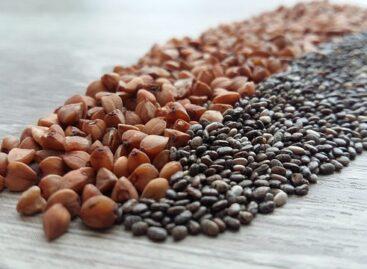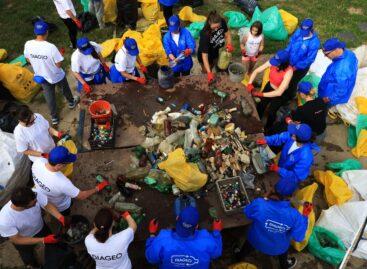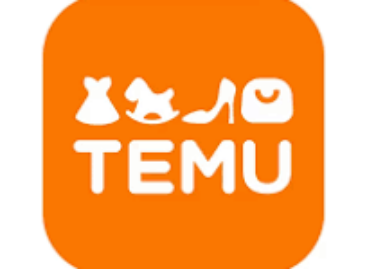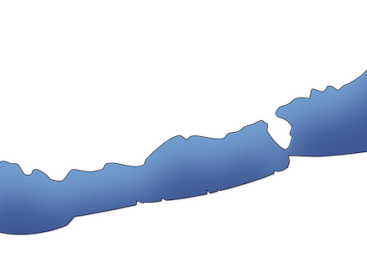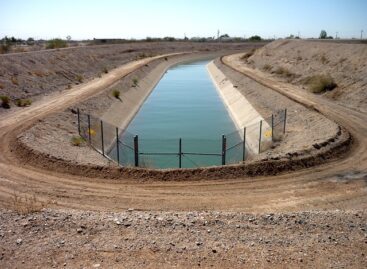The source area of the Tisza was freed from an enormous amount of garbage
About 280 tons of waste have already been collected and processed in the source area of the Tisza in Ukraine thanks to the joint Call-Action program of Diageo and the PET Cup, Diageo and the PET Cup announced on the occasion of World Rivers Day.
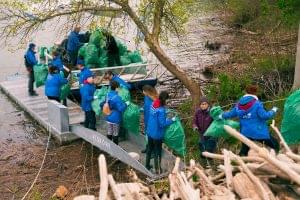
(Photo: Diageo)
Due to the difficulty of waste transportation or the complete lack of it in the scattered villages, around three million tons of untreated waste accumulated in Subcarpathia, and the exposure and burden of the region only increased due to the war situation of the past months. The waste significantly pollutes the tributaries and the Tisza, whose flow direction brings the waste to Hungary, causing significant natural damage in our country as well. The joint Call-Action program of Diageo and the PET Cup supports the increase of waste collection and waste processing capacity within the framework of a two-year collaboration, and they will also participate in the cleaning of the Tisza in the next two years.
The first steps
About 10,000 tons of waste arrive in the Tisza from Ukraine and Romania every year, the main reason for which is the lack of appropriate waste management systems in the upstream countries. As a result, the first step of the Call-Action program was to increase the waste collection capacity. With the financial support provided by Diageo, this spring, the equipment park of the professional partners in Ungvár and Beregsászás was expanded with various equipment and transport devices for proper and efficient waste collection and transport. – In the first 7 months of the Call-Action program, around 280 tons of waste were already collected and processed in the source region of the Tisza in Ukraine, thus fulfilling 40% of our commitment of 690 tons for the two-year program. Since May, the FORD Transit minibus purchased with the support of Diageo, as well as the Mercedes-Benz engine installed in the truck, have been helping to transport waste in a higher proportion and professionally in the region. We are proud of the fact that through our program the processed waste in Beregszász increased by five times the previous performance, and we were also able to increase the waste collection capacity of Ungvár. – Gergely Ábrahám, Diageo’s director responsible for corporate relations in Eastern Europe, highlighted the results of the first period. In addition to increasing waste collection capacity, supporting waste processing capacity also played a key role in the first few months of the Call-Action program. During the expansion of the equipment, a Steinbock Boss NH-20 type forklift truck was also purchased, with the help of which the workers in the sale can no longer handle the baled waste manually, but mechanized. Thanks to the forklift, more than 100 tons of waste have been processed since the start of the program, of which almost 65.5 tons were paper, but glass, polyethylene film and PET were also brought to the site in large quantities in addition to aluminum and HDPE waste derivatives. In addition, a EURO hydraulic press is already helping the works, which has already put 25 tons of paper, PET and polyethylene film under the press.
Diageo employees also participate in the Call-Action program on site
At the end of April, Diageo and PET Kupa jointly cleaned a heavily polluted floodplain area near Dinnyéshát: 100 bags, i.e. roughly 600 kilograms of waste were collected, which were sorted together the same day at the PET Kupa Small Circles River Rescue Center, the video summary of which is available to everyone.
Next steps
The set goal is for at least 690 tons – or more – of waste to be collected and processed during the Call-Action program thanks to Diageo’s support. – In order to achieve this by 2024, our partners will create even more waste collection points in Beregszász, Ungvár, Szürtén, Bátyú, Turjasebes and Kerecké, as well as install them in schools and community institutions – thus more than a total of 21 settlements, 29 schools and 61,800 local involving residents and students in the program initiated by the PET Cup. In addition, two waste-catching nets will be built on the Latorca River, which can help collect 10 tons of waste. – added Zsuzsanna Bitter, the program’s coordinator.
Related news
Divisive deal: EU import quota for Ukrainian agricultural products increases
The European Union has signed a new agreement with Ukraine…
Read more >EU recognises certificates of imported seeds from Ukraine and Moldova as equivalent
The Council of the European Union adopted a decision on…
Read more >They got into a boat for the future: Diageo’s attitude-shaping program from volunteering on Lake Tisza to cross-border actions
Diageo did not stay on the shore this year either:…
Read more >Related news
Temu has already targeted the European food market
The Chinese-rooted Temu is posing an increasingly serious threat to…
Read more >Irrigation water resources equivalent to one-third of Lake Balaton are available
Despite the extraordinary drought and lack of precipitation, we can…
Read more >Free irrigation water provided to farmers is a key element in the fight against drought
Free irrigation water provided to farmers is a key element…
Read more >

